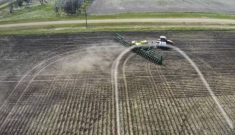” ACKNOWLEDGE THE SIZE OF THE JOB
Leaving a leadership and ownership role in any business requires preplanning. Leaving a farm business can be even more difficult.
It s no longer a simple transaction, says Larry Morin, an independent farm business adviser based in Fort Saskatchewan, Alta. who specializes in agricultural succession planning. Mom and Dad will likely need to have income from the farm for years to come, and many farm businesses are big enough that we re now talking about a lot of asset value changing hands.
Read Also

How scientists are using DNA and climate data to breed crops of the future
A method for forecasting how crops will perform in different environments so that plant breeders can quickly select the best parents for new, climate-resilient varieties.
” PLAN EARLY
Succession is not about getting a will. It s not about going to see a lawyer, says Merle Good, a business development and tax strategies specialist with Alberta Agriculture and Rural Development.
It s a 20-year process. If we can slowly get thinking about succession, it really allows parents to have a formula-based idea of what s fair and right.
Not only will clearly stating expectations ensure a fairer, smoother path through transition, your farm s finances can benefit from early planning.
For example, life insurance policies, with premiums paid by the farm and proceeds paid to any child or children who remain on the farm, can make it possible for your on-farm child or children to buy out any non-farm children s shares in the business upon your death. However, as Morin points out, If you are 50 years old and relatively healthy, it s not hard to get life insurance and it s relatively cheap. But, if you re 68 years old and have any kind of health issue, you probably can t get it at all.
” DIVIDE AND CONQUER
Planning how you will work toward a comprehensive succession agreement can seem overwhelming. However, if you break it into its component parts, the process becomes much clearer for everyone.
Estate Plan
An estate plan outlines how you want your personal assets divided upon your death and is the most straightforward component of planning your exit strategy. Estate planning focuses on a single event (your death), which means your plan has a clear beginning and end point. So long as you remember that your personal assets are not the same as your business assets, outlining distribution by writing out a will is a simple process that can be handled in as little as one visit to a lawyer.
Transition Plan
Your transition plan details how the management, operations, assets, equipment and inventory of your farm will transfer to your successor. It is vital that it define who is going to take over and according to what timeline. So too is detailing the passing over of all of the business assets. In fact, writing out the business transition means that, in the event of your unexpected death, the transfer of operations to your successor will be smooth. Your successors have to know that regardless of what you do with your personal wealth, they will get the operating assets and won t have to buy them from other beneficiaries.
The transition of responsibility for the farm is a process that may take years, especially if it is your child taking over. As such, you need to consider all kinds of what-if and contingency scenarios.
Just a few of the possibilities you ll want to think through include changing operational or business priorities, marriage or divorce, health or financial crisis, and changing financial needs.
Transfer of Land
The third and trickiest part of succession planning is the transfer of land. At issue is the fact that land is neither wholly a business nor wholly a personal asset.
If you have two non-farming children and no successor, it would be fair and reasonable if you chose to have your land value divided equally between both children upon your death. However, if one of your two children spent a decade or more working alongside you, some of that decade s increased land value should go to the farming child because of their contribution to the value growth.
Consider a formula to divide land value increases between your personal wealth, which can be divided at your death as you predetermine, and your business assets, which go directly to the farming child upon transition.
While it seems reasonable, Good says that when it comes to actually getting the job done, few families are handling the distribution of this key asset well.
Most parents hold the vast majority of their land until they die. When asked, they ll often say that they see themselves as trustees of the land, holding it until it transitions to the younger generation, says Good. However, if they hold it right through until death and the entire land value is divided as personal wealth, they re really not trustees.
” DON T SHORTCHANGE YOURSELF
One of the biggest mistakes retiring farmers make, says Myron Knodel, director of tax and estate planning at Investors Group Financial Services, is underestimating how much money they need for retirement.
In most situations the parent doesn t want to charge the child full market value (for the farm business). Parents often say they want to set up their children, but they need to carefully consider and this is a very difficult question how much they really need to retire.
” MAKE IT FORMAL
You and your children have an open and honest relationship, right? So you don t need a formal, written agreement to understand each other s expectations.
Wrong.
More farmers than we think are planning for succession inside their own brains, says Morin. Most farmers really, truly want to see the second generation succeed. They want family harmony, they want the business to succeed. What farming has not been good at is putting down formal structures.
A plan should lay out how both generations will be compensated for work done during the transition years, how equity gains will be distributed, and how both on-farm and non-farm children will be included in your asset distribution. Most importantly, a formal plan encourages open communication about expectations from all sides.
If non-farming children are not kept abreast, that s where it starts to get difficult, says Knodel. I encourage people to get non-farming children involved fairly early.
” MAKE THE RULES WORK FOR YOU
How you choose to structure your farm business for transition is unique to each family. Depending on the size of operation, goals, business requirements, and operating style, you may choose to form a family farm corporation, a partnership, or a sole proprietorship. Partnerships are less formal than corporations, and partnership agreements don t need to be rewritten every time business operations change. You may find that an estate freeze helps fairly compensate both generations.
Understand income tax rules, especially capital gains exemptions. The Canadian Income Tax Act contains special privileges intended to help preserve the family farm. When it comes to succession planning, leaving out a taxation strategy could be huge, Knodel warns.
” GET OUTSIDE HELP
Even though Morin knows some farmers are skeptical, he says it anyway. When you start succession planning, seriously consider hiring external help.
Not only will a succession adviser provide advice regarding what is financially feasible, they will help you consider myriad what-if scenarios. They will provide impartial and external advice, and will also mediate the inevitably difficult conversations about conflicting goals and vision.
Choose someone who you are very, very comfortable with, Morin says. Choose someone who has the ability to assist you with the financial side, and choose someone who understands agriculture, because agriculture is a different beast of a business. CG














